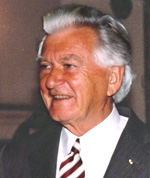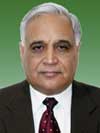Leaders Forum 2006
The 2006 WorldSkills Leaders Forum was held in Melbourne, Australia on 7 May 2006 with the theme “Transforming the way young people acquire the technical, social and learning skills needed in the 21st century”.

“I am pleased to accept patronage of the WorldSkills Leaders' Forum being held in Melbourne in May 2006. This important international gathering will discuss ways to assist young people around the world with their vocational choice and the challenges they face as they move into the workforce, while, at the same time, integrating as contributors to society and to the welfare of their country.
While governments understand and acknowledge that a skilled labour force is vital to the development, growth and stability of the economy, trends in public expenditure on education in recent years have tended to ignore traditional apprenticeship training. Today, we see the results of this neglect with a critical shortfall of skilled workers, particularly in the industrial trades. It is a consistent refrain in boardrooms everywhere.
WorldSkills has, for the last fifty years, promoted the importance of excellence and best practice in vocational education and training throughout the world and is wholeheartedly committed to inspiring and encouraging the youth of today in their vocational choice. I am very proud to be associated with the organisation and look forward to making a contribution to its continued success.”
Hon Bob Hawke AC – former Prime Minister of Australia
WSLF2006 Flyer 01 V2
WSLF2006 Flyer 02 V2
WorldSkills Leaders Forum 2006 was part of the WorldSkills General Assembly 2006
City of Melbourne website www.melbourne.vic.gov.au
Speakers
The following people delivered presentations at the 2006 meeting:

Timo Lankinen
Government Counsellor, Director for Vocational Education and Training Ministry of Education, FINLAND
Timo Lankinen holds a Masters Degree in Law (Human Rights in Criminal Proceedings). He joined the Ministry of Education in 1984. He has worked the as Government Counsellor with major development projects in the field of education and science policies in Finland (e.g. the total Reform of the Educational Legislation) and in relation to the EU education and training policies and structural funds. Since 1997 he has been Director for Vocational Education and Training. He is a member of the Directors-Generals for Vocational Training in EU (DGVT) and Advisory Committee for Vocational Training in EU (ACVT) and the Governing Board of European Training Foundation (ETF). He is also the Chairman of the Board of Skills Finland, Official Delegate to WorldSkills and he led the Executive Committee of the WorldSkills 2005 in Helsinki.

Lt Gen (Retd) S S MEHTA ,PVSM, AVSM and Bar, VSM
Principal Adviser, Confederation of Indian Industry, INDIA
The General Officer is a Master of Science in Defence Studies and a graduate of the Defence Services Staff College Wellington. He has attended the Nuclear, Biological and Chemical Defense Course at Tamishenko Academy in Moscow and is also a graduate of the United States Army War College (1990-91).
During his 41 years of Army Service he has held numerous command and staff assignments. He was the Deputy Chief of Army Staff (Planning and Systems) and General Officer Commanding in Chief, Army Training Command. Before retiring from the Army in January 2004 he held the prestigious appointment of General Officer Commanding in Chief, Western Command.
The General Officer was the Services Member of the National Task Force on Information Technology. He was also the Army member of the Group of Minister’s Task Force on Review of Defense Management.
In his capacity as Principal Adviser CII, he heads the Skills Development and Information Risk Management Initiatives and provides oversight in IT, ITES, Telecom, Broadband and Business Process Association sectors. He is also Co-chair of the Indo US High Tech Cooperation Group, and Indo-US Cyber Security Forum. He is a Member of the UGC standing committee on Public Policy Group, and a member of the National Commission Task Force on Skill Formation in the Unorganised Sector.
He is a Member of the National Security Advisory Board (NSAB).

Dr Law Song Seng
Director & Chief Executive Officer Institute of Technical Education SINGAPORE
Dr Law is the Director and Chief Executive Officer of the Institute of Technical Education (ITE), a national post-secondary institution responsible for vocational technical education in Singapore. His leadership has led to the creation of a unique ITE College Education and ITE winning the Singapore Quality Award (SQA) in 2005 in recognition of its transformation as a world-class education institution. Prior to his present appointment in 1992, Dr Law had also served as Director & Chief Executive Officer of the former Vocational & Industrial Training Board (1981-1992), Associate Professor and Head of Industrial & Systems Engineering at the National University of Singapore (1973-1983), Visiting Lecturer at the University of Auckland, New Zealand (1980), Manufacturing Development Engineer with the Ford Motor Company in the United States (1972-1973) and Lecturer in the Singapore Polytechnic (1968-1973).
Dr Law received a BE (1st class Hons) in Mechanical Engineering from the University of Auckland (1968) under a Colombo Plan Scholarship, a MS and PhD in Production Engineering from the University of Wisconsin, USA (1971 & 72) under a Ford Foundation Scholarship and attended the MIT Management programme for Senior Executives (Fall 1989). He is a Fellow of the Institute of Engineers, Singapore. Dr Law is author to more than sixty papers in journals, conferences and major reports on engineering and vocational technical education.
He is currently Chairman of ITE Education Services Pte Ltd, Joint ITE-MOE Committee on Promotion of Technical Training and WorldSkills Singapore Council and a member of the Hong Kong Vocational Training Council. He has received many awards, including the National Day Public Administration Medal (Gold) (1984), Education Award 1994 by the Japanese Chamber of Commence & Industry Singapore Foundation, Center on Education and Training’s 1997 Distinguished Service Award, Ohio State University and Medal of Commendation (2001) by National Trades Union Congress, in recognition of his national and international contributions to vocational technical education and training.

Bruce Mackenzie PSM
Chief Executive Officer, Holmsglen Institute of TAFE, Victoria, AUSTRALIA
With over 25 years in the field of vocational education, Bruce Mackenzie has played a leading role in the successful development and implementation of the TAFE system in Victoria. His contribution to the vocational education and training (VET) sector was formally recognised in his selection for the 1994 National Austafe Award for Educational Leadership. In the 2005 Australia Day Honours List, Bruce Mackenzie was awarded the Public Service Medal for outstanding services to vocational education.
He has been the Director (Chief Executive Officer) of Holmesglen Institute of TAFE since its inception in 1982 and is also the Deputy Chair of TAFE Directors Australia (TDA). Holmesglen was Australia’s first quality assured educational institution, having implemented management systems to ISO 9001 level during 1994. Holmesglen is open 7 days a week and has been since 1990. Holmesglen has in excess of 50,000 students and delivers more than 10 million student contact hours.
Holmesglen trades across Australia and internationally.
In addition, Bruce has represented the Victorian and Australian vocational education and training sector as a visiting expert to the Colombo Plan Staff College in Singapore, and as a member of various delegations to Taiwan, Malaysia, Indonesia, Vietnam, Namibia and the United States.
His current projects include the establishment of a secondary school for Years 11 and 12 within Holmesglen (“The Vocational College”), the implementation of degree programs, and the development of commercial businesses associated with the educational profile of Holmesglen.
In 2005, Holmesglen Institute of TAFE will deliver quality training to an anticipated 15,000 volunteers for the Melbourne 2006 Commonwealth Games Corporation. Holmesglen’s involvement in the Games provides not only an interesting challenge that enhances the Institute’s capacity, but is also an excellent opportunity to market Victorian TAFE training to participating countries.
Bruce has spoken at a range of conferences, written a variety of articles on TAFE in Australia and has been on a variety of government committees, and was also the lead negotiator for the State Government in the latest enterprise bargaining agreement in the TAFE sector.
Programme
Date: Sunday 7 May 2006
Time: 09:00am – 12:30pm
Venue: Melbourne Exhibition and Conference Centre - Suites 1 & 2
The Leaders Forum was followed by a luncheon from 12:30pm - 01:30pm in the Clarendon Room
Presentations:
- Introduction by Patron - Hon Bob Hawke AC, former Prime Minister of Australia
- Ministry of Education – Mr Timo Lankinen - Finland
- Confederation of Indian Industry – Lt Gen (Retd) S S Mehta - India
- Institute of Technical Education – Dr Law Song Seng - Singapore
- Holmesglen Institute of TAFE – Mr Bruce Mackenzie - Australia
Details of presentations:
1. Hon Bob Hawke AC, former Prime Minister of Australia
The Hon Bob Hawke was the Patron of the WorldSkills Leaders Forum 2006 and provided an introductory speech to the Leader Forum. Mr Hawke's speech centred around what he ". . . regards as just about the most important job in this world – that is training and equipping our young people to become economically competent and sufficient and also to make them feel what they should be and that is valued members of a society that looks to them and soon depends upon them."
2. Ministry of Education – Finland
A presentation by Timo Lankinen - " Attractiveness, Working-Life Approach And Quality – Solutions And Results In Finnish Vocational Education And Training"
Finland's success in the two most recent PISA surveys of learning results indicates that the Finnish education system is very effective.
Finland also has the envious success of attracting and increasing the enrolment of young people in VET - something that all nations would like to achieve.
After the recession in the beginning of the 1990's, Finland has again attained strong economic growth. We believe that the considerable investments in education and training have promoted the development. Vocational education and training, both upper secondary and higher education, have been reformed to answer future challenges. Upper secondary VET offers young people and adults pathways to working-life and a competitive educational channel alongside the upper secondary general school. In higher education the new vocationally oriented sector (called polytechnics in Finland) provides high-quality professionals and supports innovations and quality of industries and services.
How did we come to this? What measures have been taken towards the strengthening of VET attractiveness and how is it going?
We have needed national decisions in educational policy and commitment to put the decisions to work, and investing funds to raise the quality of vocational education and training. We guarantee study places on the upper secondary level, either in vocational or in general upper secondary education, for all basic school leavers. There are no dead ends in the education system: all the study programmes give possibities to further study at the next level. We have intensified marketing VET as equal pathway to higher education with upper secondary general school. VET channel is becoming highly competitive.
3. Confederation of Indian Industry – India
A presentation by Lt Gen (Retd) S S Mehta - "Skilling a million Indians – Galvanising skills formation across India"
The Confederation of Indian Industry (CII) works to create and sustain an environment conducive to the growth of industry in India, partnering industry and government alike through advisory and consultative processes. It is India’s premier business association, with a direct membership of over 5800 companies from the private as well as public sectors, including SMEs and MNCs and indirect membership of over 95,000 organisations from around 325 national and regional sectoral associations.
"Skilling a Million Indians" is a catalytic project of the CII, validated by international City and Guild standards, to give needed recognition and "add on" skills to the many who are informally trained on the job as well as to help galvanise skills formation across industry in India. Our speaker will share the strategy, implementation and results of this ambitious and important project.
In India's drive towards inclusiveness and sustainable growth, it is seeking to provide livelihood opportunities by skilling its workforce. It also seeks to integrate world standards and share a growing platform with nations committed to developing a skilled manpower base to improve the quality of life of their citizens.
Skills are now seen as a global currency for a globalising world. ‘Innovation' and ‘Productivity' the key drivers of growth and competitiveness. Skills as a resource seem to be increasingly in deficit. For the next three decades India enjoys a demographic advantage and will have the potential to bridge the deficit gap.
The sheer size and logistics of this project let alone the diversity of existing education levels across India ensures some challenges along the way. The speaker will share the strategy, implementation and results of this ambitious and important project.
4. Institute of Technical Education – Singapore
A presentation by Dr Law Song Seng - "A World-Class Vocational Technical Education System In Time For The Future – The Singapore Experience"
Over the last decade ITE has undergone a major transformation focusing on its mission “to create opportunities for school leavers and adult learners to acquire skills, knowledge and values for lifelong learning in a global economy”. This transformation has led it to be a recognized global leader in technical education.
ITE has just coveted the prestigious Singapore Quality Award (SQA) for attaining world-class standards of business excellence. ITE is the first Educational Institution to win the SQA which symbolises a milestone in ITE's journey towards excellence.
Dr Law discussed the major changes and key elements that ITE has implemented to aid their transformation into a world-class post secondary institution. ITE now provides a high quality vocational education to the 25% of young people who don't proceed to tertiary education.
Vocational Technical Education (VTE) Systems play a crucial social and economic role in the development and progress of a nation. By nature dynamic, they are subjected to the forces driving change in schools, industry, society and the larger global economy. They face unique challenges, as the dynamics are more complex. The target student groups are diverse, and the image, standards and values often elusive.
Against these challenges, the Institute of Technical Education (ITE) in Singapore has succeeded in transforming itself into a world-class institution focusing on its mission “to create opportunities for school leavers and adult learners to acquire skills, knowledge and values for lifelong learning in a global economy”.
The First Education Institution in Singapore to win the prestigious Singapore Quality Award for organisational excellence in 2005, it has created a unique brand of a “Hands-on, Minds-on and Hearts-on” ITE College Education. In this respect, Dr Law shared ITE's unique challenges, key initiatives and experiences in its journey of transformation. It is hoped that the presentation provides some useful insights on the underlying philosophy, policies, best practices and rationale for those who are involved in the development of vocational technical education systems.
5. Holmesglen Institute of TAFE – Australia
A presentation by Bruce Mackenzie - "How Young People Acquire Technical, Social And Learning Skills"
Holmesglen Institute of TAFE (Technical And Further Education) provide a practical approach to teaching with state-of-the-art facilities and diverse course options. Promoting the learning of real skills for the real world, Holmesglen focuses on the needs of growth industries including, among others, hospitality, tourism, small business, social and community services, and information technology.
Holmesglen is building a vocational college within the Institute that is being designed on global best practice that squarely aligns with the Leaders Forum theme of "Transforming the way young people acquire technical, social and learning skills needed in the 21st Century." Our speaker will share the research, strategy and planning for this innovative and beneficial college.
The presentation:
- Explains why Holmesglen is attempting to create a secondary school inside a TAFE Institution
- Outlines features which seem common to successful vocational education systems in Scandinavia
- Contrasts these features with the Australian vocational system
- Outlines the principles upon which Holmesglen Institute of TAFE's Vocational College is premised
- Identifies some of the issues that have to be addressed for the Vocational College to succeed at both a national and local level